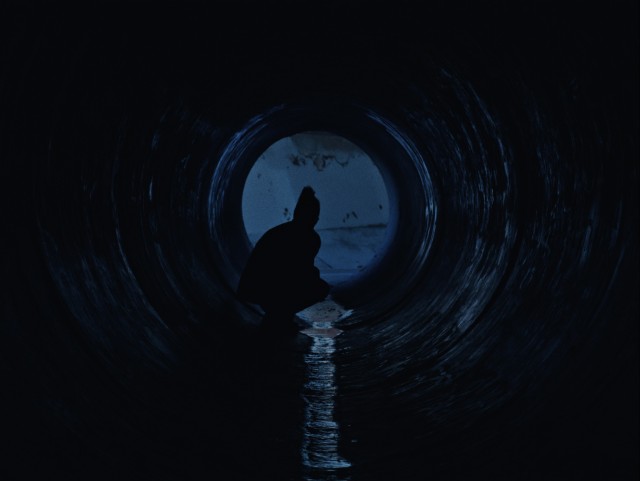“Do you believe in reincarnation?“ A big question worth pondering, and the first sentence uttered in Peter Ferris Rosati’s melancholic short Gwafi. The following dialogue, between two friends in a car outside a burger joint, evokes the kind of mood one expects from a low-key drama with philosophical undertones. We don’t yet know that this hypothetical question has a more somber implication for one of the two main characters.
Gwafi might work more like an elliptical meditation on grief and longing rather than a story-driven narrative, but when you look closer, one recognizes that this tone works despite its inherent elevatedness because it adheres to an underlying three-act structure. After the discussion in the car, the film then cuts to three years later, as we follow the short’s protagonist on what can only be described as a wandering journey. We follow her as she attempts to confront the fatal events that happened off-screen, before the film turns into a fantastical take on acceptance at the end of the five stages of grief.
“The short is inspired by my feelings and experience surrounding that loss — the closure I will never have.“
Writer/director Rosati describes Gwafi as “based on real events of loss and reincarnation.“ I’m going to allege that the “reincarnation“ part probably isn’t supposed to be taken literally, but why not? It’s one of the greatest gifts of any storyteller’s toolbox to create convincing “What If?“ scenarios to make sense of the world and their lives. At the very least, the film itself can serve as a form of reincarnation.
As Rosati discusses the origins of his narrative with S/W, he shares how his best friend passed away, from suicide, earlier this year. “We had a very special and at times complex friendship. The short is inspired by my feelings and experience surrounding that loss — the closure I will never have.“
I am grateful for Rosati’s openness about his inspiration. As someone who has lost a loved one to suicide myself, I can particularly relate to the filmmaker’s sentiment. When someone you know dies by their own hand, the contemplation of what one could have said or done is as incessant as it is futile. Grappling with this loss through a creative outlet ascribes meaning to a situation that is hard to fathom.

Is there light at the end of the tunnel in Gwafi’s conclusion.
Rosati uses his particular directorial sensibilities to depict the feelings of forlornness and simmering guilt that are so hard to communicate. Especially in the first scene following the title credits, where Alexis Floyd’s distant stare, in combination with her detached demeanor, perfectly encapsulate the helplessness one feels, while friends never really know what to say. The visual design by cinematographer Tyler Weinberger, and the score by Jacob Rosati, add to a dreamlike atmosphere that perfectly reflects the mental haze of someone who is trying to make sense of an unexpected loss.
Rosati further relates, “I guess I felt a need to make *something* in the emotional aftermath of my friend’s passing. I don’t think making this short acted as the healing process I maybe thought it would, but it did feel like a step in the direction.“ Sometimes one step in the right direction is all it takes.
In the process of trying to grapple with his loss, Rosati manages to craft an imagined conversation that most who get left behind are longing to have. I hope he finds some kind of solace in the fact that making a film this personal can bring a form of heart-balm to others. It might not be the answers we are looking for, but it is an endearing small joy of watching Gwafi that an eventual version of solace can be found at the literal end of a tunnel. It may not be the proverbial light, but it is a glimpse of hope that someday the healing process can begin.

 Georg Csarmann
Georg Csarmann